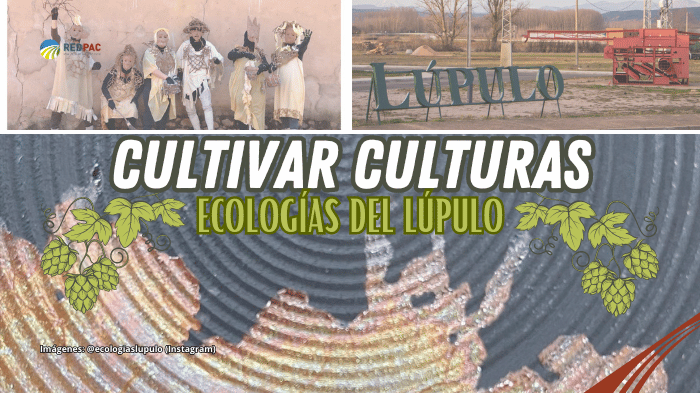
27 de May de 2024
Dinamización rural
The 'Cultivar Culturas: Ecologies of Hops' project has given rise to this idea, which seeks to create new hop values in a province where 95% of this byproduct in Spain is produced.
- The primacy of hops in the province of León has led to a search for the revaluation of this byproduct to generate new uses and vindicate its cultural and scientific legacy.
- After two and a half years of work, the Leonese hops have a memory bank, a collection of varieties, a sound archive and several audiovisual works that support this by-product.
In the field of research and innovation, there are many projects working on the revaluation of byproducts to generate new opportunities, such as the Sebastiana Operational Group or the Local Action Groups (LAG) of Mallorca and Menorca with wool, or ESjara and rockrose. In this regard, hops were also waiting for their chance.
This byproduct is widely used in Spain, primarily in beer, and its production is concentrated in a single province: León. This province produces 95% of all the country's hops, with nearly 550 hectares of cultivated land.
Given the opportunity this market offers for the area, the Agrarian Technological Institute of Castilla y León ( Itacyl ) has begun researching the revaluation of resources and also the waste that is derived from it.
The project
This idea didn't come from scratch; it emerged from a project called 'Cultivating Cultures: Hop Ecologies' , which combines science and art to create a memory of the plant through biomaterial experimentation and citizen participation.
Itacyl, which leads the project, has carried out its actions with three specific objectives in mind:
- Biomaterial experimentation , that is, testing products designed to interact with other biological systems. These are natural and sustainably produced.
- Promoting the exchange of knowledge.
- Promoting sustainable practices to develop a circular bioeconomy.
Thus, after two and a half years of progress, the project has achieved the following results:
- Creation of a Memory Bank : with plant material that can be used for future genetic analysis. It consists of 109 herbarium sheets of all types of varieties.
- Foundation of a “ living collection” : This is a group of hops at the School of Agricultural and Forestry Engineering in León, which includes varieties of historical interest and others cultivated today.
- Establishment of a sound archive : This consists of interviews with traditional and current hop professionals, as well as individuals with varying degrees of connection to the field. Finally, it includes sounds from the hop landscape, "filandones" (former nighttime gatherings where stories were told while crafts were done), and other public workshops.
- Audiovisual production : a documentary ( 'Not Just Flowers', 2023 ) and four fragments on the byproduct's cultivation cycle have been produced ; a vinyl audio publication; and a biomaterials sampler.
- Collaboration with multidisciplinary professionals : We have worked with artists , artisans, master basket makers, and researchers, leading to new uses for hops in baskets, bio-construction materials, and other artistic projects. This has led to creative workshops and the creation of hop-based masks, clothing, and other items.
As of May 2024, the project is working on a multidisciplinary scientific publication to unite the results of scientific-artistic collaboration and thus "biocultural memory in rural areas and its relationship to an agroecological future," as the institute itself states.
Looking ahead , Itacyl aims to offer technical support in more hop valorization processes in various ways:
- Delving into the creation of biological textiles and materials with varied applications: bio-based construction, surface coatings, crafts, and cosmetics, among others.
- Integrating residues from other crops in León, such as corn (which accounts for 25% of the national crop).
- Creating a biocultural archive , since throughout the project process a wide variety of interviews, videos, objects, fabrics, dyes, DNA, and various materials have been obtained that can be used to form a highly valuable cultural and scientific memory in the future.
The project is made up of Itacyl, which has led the research and development of the project through its R&D&I Center for Biofuels and Products ( CBB ); the León Provincial Council and the Carrizo de la Ribera City Council , which co-finance the project and offer institutional support; the Daniel and Nina Carasso Foundation , which funded the project through the "Componer Saberes 2021" call ; and a significant number of collaborators from the world of art, crafts and research (biology, anthropology, agricultural studies, botany and genetics).









